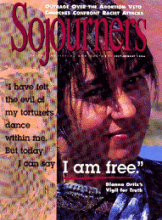I WAS MOVED by Oliver Thomas’ commentary, “Neutral and Free” (March-April 1996). Unfortunately his first principle, neutrality, and his second principle, the right to exercise religion freely, often conflict. Within a school setting, where peer relationships, interactions, and pressures are so integral to a student’s experiences, an environment within which many students are exercising their rights may not appear neutral to students of a minority religion.
The concern about the damage that public schools do, or the fear that they “undermine” values, is perhaps a projection of the adults’ concerns about their own religion and the effect which it may or may not have upon their children.
I think I know what Thomas means in his comments about values; however values are a matter of personal choice. They are based on absolute truths; however, we must choose to accept those absolute truths. The meaning of those truths is subject to endless interpretation, and the behavior that flows from that meaning is subject to further interpretation.
We should examine why it is that exposure to ways of looking at the world that are different from our own is seen as such a threat by some parents. It has never been obvious to me that a secular curriculum needs to destroy or hurt a child’s faith. (It is interesting that this feeling is a reflection of my religious faith, my values, etc.—which may be the same as someone who reaches the opposite conclusion!)
It is much more destructive for a child to feel singled out of groups, or, much worse, feel pressured to join groups, based on their religion. Parents do have the ultimate responsibility for the religious upbringing of their children and the values—those that are practiced, not those that are preached—are learned by a child at home long before they reach the public schools.
Daniel Wolpert
Chester, Vermont
Read the Full Article
